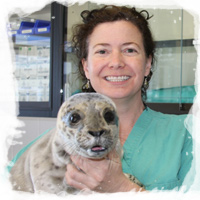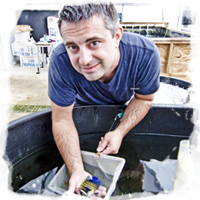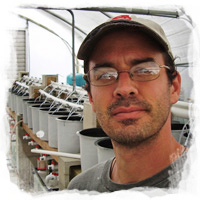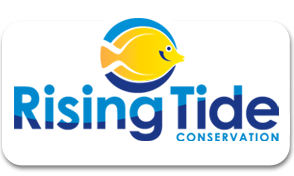About Us
Rising Tide Conservation is an initiative of the SeaWorld & Busch Gardens Conservation Fund.
Program oversight is by a board of advisors made up of environmentalists, professional aquarists, and leaders in the aquarium hobby. Day to day activities include developing fish propagation techniques, information dissemination, and project oversight. It's a big job - but we're up for it.
Current Key Players
Dr. Judy St. Leger

Dr. Judy St. Leger is the director of Rising Tide Conservation. She is the Director of Pathology and Research for SeaWorld Parks and Entertainment. Dr. St. Leger is committed to advancing marine environment protection. Her role is to provide oversight and to facilitate communication about the program and the advances being realized.
Dr. St. Leger is a veterinarian with a special interest in pathology and disease ecology. While raising fish may seem removed from this focus, Rising Tide Conservation is about providing healthier alternatives to collecting fish from the reef. The health of reefs is important to everyone. She's a graduate of Cornell University and did her residency through UC Davis at their diagnostic laboratory in San Bernardino, CA. Judy came to SeaWorld in 2000 to pursue her interests in the marine environment. Her job in leading Rising Tide Conservation relies upon the excellent support she gets from the advisory board and stakeholders.
Dr. St. Leger is a leader in Veterinary pathology with roles as mentor, lecturer, author, and journal associated editor in this field. Her contributions continue in this area but her immersion into marine conservation and aquaculture is influencing her focus. As time moves forward, we expect her to dedicate more and more attention to the issues of the marine fish and reef concerns.
Dr. Matt Wittenrich

Matt Wittenrich is a marine biologist who has been deeply involved with the aquarium world since the age of 15. A native of western New York, he began breeding saltwater fish in his parent’s basement, successfully raising 13 species by age 18. Matt obtained his Bachelor’s degree in Marine Biology from Long Island University, Southampton College. He has been part of diverse research projects from sex change strategies in pseudochromids, examining if larval clownfish can hear the natal reefs where they hatched, and understanding how larval fishes feed. Matt received his PhD from Florida Institute of Technology looking at marine fish rearing based on larval morphology.
As a senior scientist at the University of Florida's Tropical Aquaculture Laboratory he is tasked with developing rearing protocols for small egg pelagic spawning species such as angelfishes and butterflyfish. Dr. Wittenrich’s current research continues his focus how tiny marine larvae survive in the wild as well as developing novel methods for rearing them in captivity.
Matt is the author of The Complete Illustrated Breeder’s Guide to Marine Aquarium Fishes. The Breeder's Guide, published in 2007, is a cornerstone publication for the breeding of ornamental marine fish. It provides a compendium of the first 40 years of marine ornamental aquaculture. Dr. Wittenrich gained the most notoriety within the commercial and private aquarium realm by demonstrating that large-scale culture of mandarin dragonets (Synchiropus spp.) was a viable commercial possibility. This forever changed the outlook for this species group, which are among some of the most challenging fish to keep in captivity, but also some of the most-harvested as well. Dr. Wittenrich received MASNA's Aquarist of the Year Award in 2010 in recognition of his impact on the future of the aquarium hobby and industry.
Mr. Eric Cassiano

Eric received his B.S. in Marine Biology from Hawaii Pacific University in the spring of 2002. He spent time in Orgeon working on aquaculture of the Pacific Oyster, Crassostrea gigas and then in Florida he focused on various production aspects of the hard clam, Mercenaria mercenaria. In 2009, he received his M.S. in Fisheries and Aquatic Sciences from the University of Florida focusing on Florida pompano, Trachinotus carolinus, larvae fed nauplii of the calanoid copepod Pseudodiaptomus pelagicus. Eric joined the Tropical Aquaculture Laboratory in October 2010 as a part of a new project exploring the production of marine ornamental fish species.
Eric's current Ph.D. research focuses on exploring the use and production of alternative live feeds for first feeding marine ornamental fish larvae. This work has two specific focuses:
- Marine ornamental fish reproduction and larviculture
- Production of live feeds for marine ornamental fish larviculture
Expanding the number of marine ornamental fish species in commercial production relies upon looking beyond the readily available live feeds and exploring the numerous phytoplankton and zooplankton available. Alternative live feeds organisms, including copepods, dinoflagellates, ciliates, appendicularian larvae, nudibranch trochophores, and bivalve larvae, all have potential for use and production as a live feed in marine fish larivculture.






